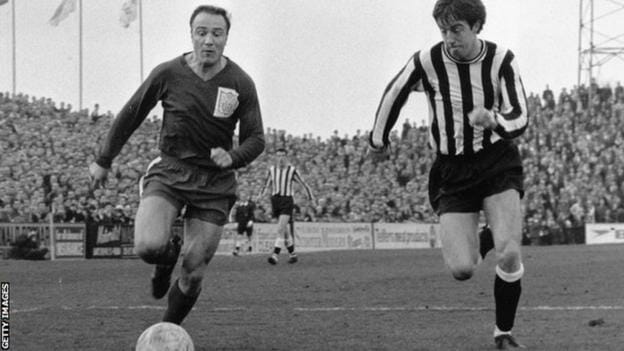

George Cohen, who died on 23 December, aged 83, will forever be immortalised as one of just 11 men to start and win a football World Cup final with England.
He was manager Sir Alf Ramsey’s first-choice right-back throughout the triumphant 1966 tournament, played on home soil and culminating in the trophy-clinching 4-2 success over West Germany.
He played in every minute of his country’s games at that World Cup, racking up six of the 37 caps he would earn in total between 1964 and 1967.
Although he never scored for England, he was not lacking in the kind of attacking intent encouraged in modern full-backs.
This was most evident in the World Cup semi-final in which his overlapping run and cross enabled Bobby Charlton to score the second goal in a 2-1 win over Portugal.
His relatively modest number of caps, in contrast to some of the other players in that World Cup winning side, is no detraction from his talent.
He was the first of the ’66 team to retire from international football – his final cap coming in a 2-0 win over Northern Ireland in November of the following year – but was lauded by some of the most high-profile figures in the English game.
Having selected Cohen for his debut in a 2-1 win over Uruguay at Wembley on 6 May 1964, Ramsey continued to pick him during Jimmy Armfield’s absence through injury and kept faith with him when the Blackpool player returned to fitness before the World Cup.
The England boss was unequivocal in his view, calling Cohen “England’s greatest right-back”, a view supported by legendary Manchester United winger George Best, who claimed he was “the best full-back I ever played against”.
He was one of five members of that England side belatedly awarded with British honours in 2000, following a media campaign to recognise their achievement alongside that of their peers.
He, along with Alan Ball, Roger Hunt, Nobby Stiles and Ray Wilson were given deserved MBEs.

He also has the honour of being the only Fulham player to win a World Cup while a Cottagers player.
His entire club career was spent with the London club, where he made 459 appearances between 1956 and 1969, scoring six goals, before injury forced his retirement at the age of just 29.
His tally places him sixth in the list of all-time appearance-makers for the club, led by fellow England international Johnny Haynes, who played a whopping 658 times.
Cohen remained in the game after his retirement, taking on relatively low-key coaching roles, firstly with Fulham’s youth team and then in a brief stint as manager of non-league Tonbridge Angels, who he led to victory in the Kent Senior Cup in 1974-75.
While his 13 years at Fulham may not have brought him any winners’ medals, his service to the club has since been marked with a statue outside Craven Cottage, unveiled in October 2016 to also mark the 50th anniversary of the World Cup win.
A regular at Craven Cottage in his later years, he would host groups on matchdays in a part of the club’s hospitality suite named in his honour.

His World Cup medal can also be viewed at the ground after the club purchased it in 1998.
Cohen’s life was also impacted by tragedy and hardship.
In 1971, his mother was killed when she was run over by a truck and, in 2000, his brother Peter died aged 58 after he was attacked while trying to break up a fight outside a Northampton nightclub.
Five years after his mother’s death, with him aged 36, he was diagnosed with bowel cancer, a disease he thought he had rid himself of twice over a 14-year period before finally getting the all-clear in 1990.
It was this that partly prompted his charity work, which included acting as a patron for the Bobby Moore Fund, which raises funds for research into bowel cancer and was set up by the widow of Cohen’s 1966 team-mate and captain, who died of the disease aged 51 in 1993.
Cohen was also vocal in his demands for a public inquiry into dementia in football, following research that suggested ex-professionals were more than three times at risk of the condition.
His overriding sporting legacy though will be as one of his country’s few World Cup winners. And it is a quality shared in his family.
In 2003, his nephew Ben, the son of Cohen’s brother Peter, started and helped England win the 2003 Rugby World Cup for the first time.






